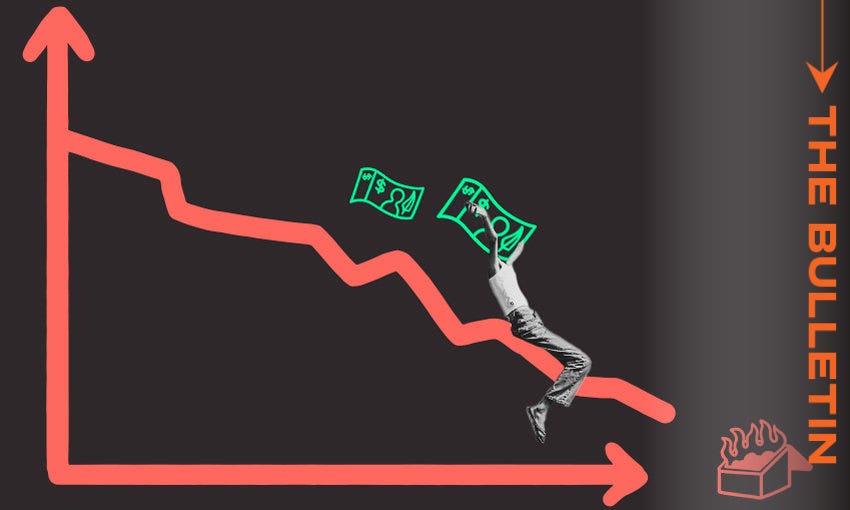Cost of living pressures continue to ease
Inflation is dropping, but will it be enough to drag the OCR down with it?
Mōrena, and welcome to The Bulletin for Thursday, January 25, written by Catherine McGregor.
In today’s edition: Wayne Brown livid over cost of Auckland pedestrian crossings; Luxon tells Rātana audience the government will honour the Treaty; Alleged long-term victim of former All Black Byron Kelleher speaks out. But first, the trend line is looking good – but for the Reserve Bank “sticky” domestic inflation is still the fly in the ointment.
Inflation slows to its lowest rate in more than two years
Good, but perhaps not good enough. That’s the consensus response to the latest inflation figures from Stats NZ. Inflation rose by 0.5% in the final quarter of 2023, exactly in line with economists’ expectations but lower (ie better) than the Reserve Bank’s (RBNZ) forecast of 0.8%. The annual inflation rate dropped to 4.7% (from 5.6%), the lowest it’s been since June 2021. "Prices for about one-third of all items in the CPI [consumer price index] basket decreased in the December 2023 quarter, the most in over three years,” said a Stats NZ spokesperson. While tradeable inflation – that related to goods and services that are imported or in competition with foreign goods – is dropping swiftly, domestic factors aka non-tradeables are now the dominant drivers of inflation, rising 1.1% for the quarter and 5.9% for the year.
‘The worm has most definitely turned’
To bank commentators, the numbers are a sign the economy is heading in the right direction. “A year earlier, annual inflation was 7.2% which it had averaged across calendar 2022. The worm has most definitely turned, and we think inflation will keep falling relatively quickly for the next few quarters,” said Stephen Toplis, head of research at BNZ. The self-reinforcing nature of inflation expectations should drive further falls, said Kiwibank economist Jarrod Kerr: “We are winning the (psychological) war on inflation.” Kerr expects to see inflation back within the RBNZ’s target range of 1% to 3% by the second half of the year. ANZ’s Henry Russell was a little less bullish. The RBNZ, he said, “is winning the war, just not quite as fast as they’d hoped”.
What the numbers mean for interest rates
Whether yesterday’s announcement heralds the start of the Reserve Bank’s rate-cut season depends on who you ask. For Westpac’s Satish Ranchhod, the stubbornly high non-tradeable numbers will give RBNZ governor Adrian Orr pause. The current picture is of “‘lower’ inflation; not low inflation,” he said. “Rate cuts won’t be on the table in the near term.” Kerr disagrees. With annual inflation heading towards 3%, “rate cuts are not too far away,” he thinks. Council of Trade Unions economist Craig Renney has a different take, noting that the fall in inflation “doesn’t appear to have been driven by government spending [cuts] in any significant way”. His takeaway: planned public spending cuts “will simply hurt those who use those services, with little or negative economic benefit overall”.
The muted impact of debt to income ratios
For first home buyers, now responsible for a record-high share of the property market, the other big news of the week is the imminent introduction of debt to income (DTI) ratios. As covered in yesterday’s Bulletin, the RBNZ plans to limit most borrowing to six times income for owner-occupiers, and seven times income for investors – though these “guardrails” won’t be activated anytime soon. Writing on Interest, David Hargreaves says once the measure is in the RBNZ’s arsenal, it can be implemented without government approval. “And of course it can be changed – to be more strict or more loose as needs determine. Which is the important bit.” Still, with interest rates unlikely ever to be as low as they were in the last housing boom, DTIs may not matter as much as they might have. “Well done to the RBNZ for sheer dogged perseverance,” says Hargreaves, “but I do wonder if DTIs can ever be quite as effective again as they might have been some years ago.”
Pacific professor of psychology a first for Otago
Beginning her new role in February, the University of Otago's first Pacific professor of psychology, Dr Siautu Alefaio says she is humbled and heartened by her appointment, which reflects the University’s authentic drive toward meeting the needs of Pacific peoples and communities.
Head of the Department of Psychology, Professor Jamin Halberstadt, says professor Alefaio will be a role model and mentor to the growing Pacific and staff cohorts at the university, "bringing new ideas, new impacts, and new intellectual diversity to our community.”
Read more about the University of Otago’s first Pacific Professor of Psychology.. (sponsored)
Wayne Brown livid over cost of Auckland pedestrian crossings
Auckland mayor Wayne Brown is on the warpath over news that Auckland Transport is spending up to 10 times more than its Wellington counterpart on pedestrian crossings. AT spent $6 million at an average of $500,000 each on 12 raised pedestrian crossings, reports Bernard Orsman in today’s Herald. Last year AT spent $490,000, including $172,000 on traffic management, to replace an existing pedestrian crossing on Williamson Ave, Grey Lynn, with a raised one. “There are people in AT who have convinced themselves that is a good spend of money, and it’s not,” said Brown. The raised crossings were part of a road safety programme which Brown says the council is no longer going to fund. AT chief executive Dean Kimpton says the $40,000 cost of a raised pedestrian crossing in Hataitai, Wellington, that Orsman highlights was for the raised pedestrian table only, which is made of asphalt that lasts for 10 years, “whereas the Grey Lynn crossing is made of concrete that lasts up to 40 years”.
Luxon tells Rātana audience the government will honour the Treaty
PM Chris Luxon received a muted response to his speech at the Rātana celebrations, with the fireworks reserved for NZ First’s Winston Peters and Shane Jones whose speeches both drew heckles from the crowd. Luxon said he wanted to work with Māori to improve health and education outcomes. As for te Tiriti, "The government has no plan – and never has had plans – to amend or rewrite the Treaty," he said. While the deep divisions remain, Luxon’s willingness to go to Rātana – unlike his coalition colleague David Seymour, the only parliamentary party leader not to attend – will have earned him points, writes 1News’ Felix Desmarais. “[In] Māoridom there is respect for those who are willing to throw themselves in the lion's den and face disagreement. And Rātana is likely a microcosm for the discussion around Māori issues ahead, with no words minced on any side.”
The Spinoff is powered by its supporters
In 2023, Spinoff readers funded some of our most beloved, well-read, impactful work. Help Me Hera, The Cost of Being, powerful longreads, Election 2023 coverage, laugh-out-loud satire, Auckland stories, Wellington stories, Christchurch stories and everything in between were powered by Spinoff members and donors. If you did support us, thank you from all of us at The Spinoff. If helping fund well-crafted and insightful journalism is on your list for 2024, donate today or sign up to become a Spinoff member.
Click and Collect
The ex-fiancee of Byron Kelleher says she experienced multiple incidents of domestic violence over the course of their 16-month relationship. The former All Black is currently facing assault charges related to another woman in France.
A strong magnitude 5.2 earthquake hit the Hawke’s Bay in the early hours of this morning, with shaking reported throughout the lower North Island.
Photos show vandalised interior of Gulf Harbour Country Club on the Whangaparāoa Peninsula, which closed suddenly in July.
A plane that Russia says had Ukrainian prisoners of war onboard has crashed, killing all 74 passengers. Russia has accused Ukraine of shooting it down.
The walkway to Cathedral Cove in the Coromandel may never reopen again, warns DOC
Feeling clever? Click here to play 1Q, Aotearoa’s newest, shortest daily quiz.
As Wellington grapples with a water crisis, Joel MacManus presents a simple guide to help you point the finger. The Kiingitanga has been in the news a lot recently. Jamie Tahana explains what it is, and how its mana has endured. Writer Linda Burgess tells us the book she would take to her grave. Gabi Lardies talks to geopolitics expert Robert Patman about the NZDF deployment in the Red Sea. Shanti Mathias looks at why questions are being raised over two government ministers’ presence at a Hindu nationalist rally. And Mad Chapman decries the “reckless reporting” that got the Avondale Santa parade crash so wrong.
Sporting snippets
Bans looming for Wellington Phoenix fans who started fights at Friday’s match in Wellington.
Sixth-seeded Alexander Zverev beats second-seeded Carlos Alcaraz for a place in the semi-finals of the Australian Open.
Got some feedback about The Bulletin, or anything in the news? Get in touch with me at thebulletin@thespinoff.co.nz.
If you liked what you read today, share The Bulletin with friends, family and colleagues.












That Wayne Brown may be a grouchy old bugger but he’s good value
Hi, I like the idea of a quiz, but your questions are not general knowledge questions and certainly not for anyone over 50.
Cheers